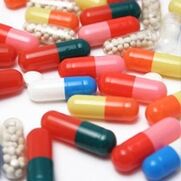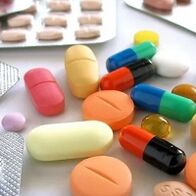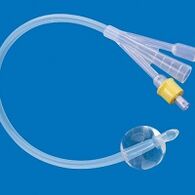
In modern medical practice, prostatitis is the most common urological disease in men.
The cause of male prostatitis may be bacterial infection or male lifestyle.
This is a disease that is not worth starting. In the initial dysuria, it is necessary to consult a urologist, conduct a comprehensive examination and make a correct diagnosis.
Without proper treatment, prostatitis can lead to prostate cancer, which cannot be cured with drugs.
The main drugs for the treatment of prostatitis
The main types of drugs used to treat prostatitis:
- With Alpha blocker. . . The preparation containing this active ingredient can improve the breath of the detrusor muscle, thereby significantly improving urination.
- Contains 5 alpha reductase inhibitors. . . This group of drugs can relieve adenomas and relieve pain. It is recommended to use in conjunction with physical therapy procedures.
- Herbal anti-inflammatory drugs. . . They are very effective, have a strong bactericidal effect, and have almost no side effects and contraindications.
important!There are contraindications and side effects, so self-medication is unacceptable-the urologist should choose the medicine and dosage.
Methods of treating prostatitis with drugs
Can be assigned to patients:

- Rectal suppositories.The drug stimulates the metabolism. The suppository is injected in the supine position, and then provides half an hour of rest. The treatment process can last up to ten days. There may be side effects such as allergic reactions or itching.
- injection.They stimulate the activity of the prostate and strengthen the immune system and vascular system. The doctor prescribes the medicine through the muscles. The treatment process can last up to ten days. There are no obvious side effects.
- Drip.The doctor injects the medicine directly to the destination through the urethra. Inject no more than 5 ml of the mixture at a time. Before the operation, the bladder must be emptied.
- Enema.The enema solution is made on the basis of herbal medicine. Enter a hot enema before going to bed. Basically, sage, chamomile, motherwort and calendula are used for this purpose. Inject no more than 100 ml of hot solution into the rectum.
- pill.The treatment of prostatitis involves the use of broad-spectrum antibacterial drugs. This is especially important when the cause of the disease has not been determined.
important!Antibiotic therapy is used to treat acute and bacterial prostatitis.
Rectal suppositories are used to treat prostatitis
Rectal suppositories are one of the most effective treatments. They have a wide range of effects and have a positive effect on diseased areas.
The most effective and commonly used drugs include:
- Candles and fish oil. . . They have anesthetic and antiseptic effects and improve blood circulation. These suppositories are usually combined with pills and physical therapy. The candle does not have a very pleasant smell, but this does not affect the skin in any way. The drug is contraindicated in the presence of internal hemorrhoids and anal fissures.
- Propolis candle. . . They have anti-inflammatory effects and relieve pain during urination. The drug has no contraindications (except for individual tolerance of the ingredients), so it is usually used as a preventive measure.
- Indomethacin suppositories.They relieve swelling and inflammation, while normalizing prostate function. Use in advanced situations. This medicine has contraindications and requires a doctor's consultation.
Injection for treatment of prostatitis
Modern medicine provides injectable preparations designed to treat the prostate and strengthen the male immune system.
These drugs improve the regeneration process. Injections are used for conservative treatment or prevention to protect the prostate from viruses. These drugs have contraindications, so only doctors can prescribe them.
Drip

The method is based on the introduction of drugs into the affected area.
This method allows you to completely remove bacteria. Ozone solution, preservative is used as medicine.
important!The drip procedure is only performed in the doctor's treatment room. Only he can choose the correct medicine, insert the catheter into the urethra, and perform all necessary operations to keep the solution inside.
Depending on the course of the disease, the course of treatment lasts 1 to 2 months.
This procedure is performed 2-4 times a week.
Medicine for treating prostatitis
Tablets (such as candles) are divided into different groups based on actions. The medication is prescribed by the urologist only after a complete examination, which will determine the stage of the disease.
important!There are contraindications and side effects, so self-medication is unacceptable-the urologist should choose the medicine and dosage.
The most common are prescription drugs:
- Anti-inflammatory (medicine. . . for acute prostatitis and pain during urination. Drugs can effectively treat prostatitis and prevent it from becoming a chronic disease.
- Antispasmodic. . . a group of drugs that relieve cramps and relax muscles, which can significantly improve blood circulation.
- Antibiotics. . . Prescription for bacterial prostatitis. Which antibiotic to prescribe is determined by the doctor who performed the test. Antibiotics are taken with rectal medications.
Antibiotics for prostatitis

Let's discuss the last group of drugs in more detail.
Fluoroquinolones are relatively newly developed modern antibacterial agents. Compared with other broad-spectrum antibiotics, they have more advantages. This group of drugs does not actually cause immunodeficiency. Fluoroquinolones have a wider range of effects on microorganisms.
Preparations of tetracycline groups can also be used. Usually, these funds are used for infectious and chronic prostatitis.
Antibacterial drugs are prescribed only after testing for infection. Before the results are obtained, symptomatic treatment is performed to reduce pain and inflammation.
The course of antibiotic treatment lasts for about one month, and then the patient's condition is clinically monitored.
Good results can be obtained through complex therapies aimed at enhancing the body's overall and local resistance to disease-causing factors. Only in this case can a complete recovery or long-term remission be possible.



























